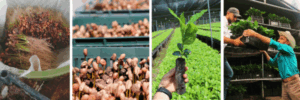Coffee farmers are continually replenishing their farms with new seedlings to maintain healthy production levels — a process known as renovation. This often-unseen work involves the propagation, planting and tending to of thousands of seedlings, each of which will take three to five years before it produces fruit. In Honduras over the last decade, NKG exporter Becamo has grown and distributed millions of certified, highly productive coffee seedlings to producers. This extraordinary number is thanks, in part, to Becamo’s proprietary planting technology, Ecopil.
What Is Ecopil?
Ecopil is a biodegradable paper mesh cylinder system that holds seedlings in a nursery. The cylinder includes a peat substrate (providing structure and protection) and organic matter (specifically, nutritional coffee pulp). While seemingly simple, the design delivers significantly improved outcomes compared to traditional plastic bags:
• Biodegradable: Ecopil biodegrades in four months, which saves both plastic waste and planting time. On average, 600 Ecopil seedlings can be planted in a day, versus 250 in plastic bags that need to be gingerly removed.
• Smaller footprint: Ecopil’s design and composition translate into a more compact container. A box that traditionally held 15 plastic pots can now hold 60 Ecopil seedlings. At the truckload level, that’s 20,000 Ecopil plants versus 5,000 plastic-potted plants, significantly lowering the cost — and increasing the efficiency — of transporting the seedlings to their final home.
• Stronger roots: Seedlings grown in Ecopil develop a strong secondary root system — i.e., the lateral, side-branching roots that develop off the primary basal roots. Plants with robust secondary roots have a much more solid head start on life, quickly taking hold when planted and immediately taking up nutrients. They’re heartier over time and grow more vigorously initially — while a plant with a more minimal system can deplete itself, expending energy for root development.
• Less nursery time: Because Ecopil seedlings grow heartier roots more quickly, they only need to spend four months in the nursery before they’re ready for the field.
• Variety confirmation: Farmers sometimes purchase seedlings, or even plant their own, without absolute confirmation of the variety they’re planting. Becamo’s Ecopil seedlings are disease tolerant and highly productive varieties that have been verified by World Coffee Research. (Read more about why WCR certified varietals matter and about the Becamo nursery’s WCR Silver Level Certification.)
A Legacy of Sustainability
In 2012, the coffee leaf rust epidemic decimated nearly a quarter of the country’s coffee farms — a devastating reality, in a country in which coffee represents 25 percent of all agricultural jobs and 26 percent of the agricultural GDP. Becamo responded to that moment, in part, by initiating a sustainability program to support smallholders through the recovery of ultimately 84 hectares (more than 200 acres) of coffee plants. Its program — Recuperando mi Cafetal (RMC) — evolved into Becamo’s Unit for Sustainable Services to Producers (USSP), now a part of NKG Bloom and an entire department dedicated to hosting programs and projects that improve the environmental, social and economic conditions of producing families in Honduras.
Presently, Becamo raises seedlings in nurseries in Yoro, Olancho, Copan, Comayagua and Francisco Morazán. This year, its production goal is to distribute 15 million plants to farmers — an incredible goal that it intends to reproduce again next year. In alliance with strategic partners, Becamo is distributing Ecopil seedling packages to producers across Honduras. Those with 0.7 hectares or more will each receive a package of 2,900 to 8,700 plants. While this seedling package is a primarily coffee plants, it also includes forest plants (to contribute to reforestation) as well as fruit trees (to increase food security and diversify income).

Through innovations like Ecopil and long-term sustainability initiatives, Becamo not only empowers individual farmers but also reinforces the foundation of the entire coffee value chain. As millions of resilient seedlings take root across Honduras, these efforts are cultivating a more sustainable and productive future for coffee-growing communities and the industry as a whole — and for that we extend to them our warmest thanks. •